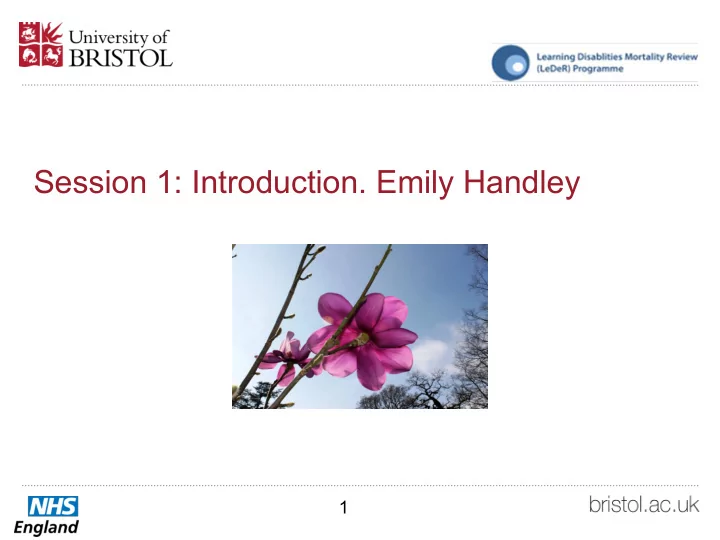

Session 1: Introduction. Emily Handley 1
Why is the LeDeR programme so important? • Reviewing deaths of people with Learning Disabilities • Identifying: best practice service improvements • Reducing health inequalities & premature mortality 2
What do we know about deaths of people with Learning Disabilities? Death by Indifference (2007) • Worse healthcare in the NHS than the general population due to “institutional discrimination” CIPOLD (2013) • Dying 20 years younger than general population • 3 x as likely to die from a cause of death that could be prevented by good quality care 3
Connor Sparrowhawk & The Mazars Report • Connor’s family campaigned tirelessly for thorough investigations into Connor’s death • The Mazars report found <1% of deaths of people with LD were investigated • The CQC found no single NHS trust that was doing a good job of reviewing mortality 4
CQC Report: Learning, Candour & Accountability • Families told the CQC they had a poor experience of investigations & were not consistently treated with respect, sensitivity & honesty • Many trusts said they value family involvement • NHS staff don’t feel confident enough to involve families in investigations 5
What families want from reviews & investigations • To know how and why their relative died • Clarity, truth, accountability • To know there will be change Julian, 2016 6
Family Perspectives “The irony is we “I didn’t want to be “It would mean that never wanted to placated with her suffering and her lodge a formal answers that were death had achieved complaint... We formed in such a something of lasting didn't want it to be way that they value” about blame, we caused less hurt” wanted it to result in (Karen, sister of good learning” (Melissa, Mum of Robin) William) (Scott, father of Julian, 2016 Sam) 7
What helps families? • Compassion and humanity • Honesty and detail • Support and family liaison • Involving families in investigations • Ethical practice • A focus on change and improving practice Julian, 2016 8
Family Perspectives “They did not rush us. They went at our pace…They were human. They cared and their compassion will never be forgotten” (Melissa, Mum of William) ‘She came to see us, the kindest thing anyone ever did for us. She was exceptional…and went through the post mortem’ Julian, 2016
The role of Bereavement People react in different ways to loss (e.g. sadness, anxiety, anger, guilt, denial) If grief symptoms do not fade or get worse, we may experience “complicated grief” Traumatic circumstances can increase the risk of complicated grief (e.g. unexpected deaths)
Engaging bereaved families in LeDeR • It is important for families to understand how somebody died • Efforts to “protect” families can actually worsen their grief (e.g. complicated grief or secondary trauma) • Families play a critical role in helping us learn from deaths • Although families may be upset, this is a normal part of grief • We must engage with each individual and be guided by them
Working together to supporting reviewers • This work may have an emotional impact on reviewers & LACs, as bereavement is universal. • Family engagement in mortality reviews is a new direction of travel for health/social care • Reviewers need support to develop the skills, confidence & resilience to undertake this work. • Engaging families well will support the development of a learning culture & improve services.
Contact details LeDeR website: www.bristol.ac.uk/sps/leder Bristol team email: leder-team@bristol.ac.uk Bristol team phone number: 0117 3310686 Regional coordinators: Robert Tunmore (South): r.tunmore@nhs.net Maria Foster (North): maria.foster2@nhs.net Louisa Whait (Midlands & the East): louisa.whait@nhs.net Emily Handley (London): emily.handley1@nhs.net
Recommend
More recommend